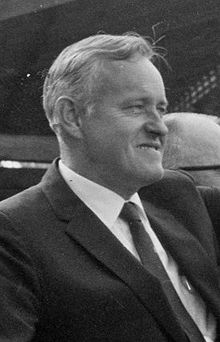Tom McCall | |
|---|---|
 | |
| 30th Governor of Oregon | |
| In office January 9, 1967 – January 13, 1975 | |
| Preceded by | Mark Hatfield |
| Succeeded by | Robert W. Straub |
| 18th Secretary of State of Oregon | |
| In office January 4, 1965 – January 9, 1967 | |
| Governor | Mark Hatfield |
| Preceded by | Howell Appling |
| Succeeded by | Clay Myers |
| Personal details | |
| Born | Thomas Lawson McCall March 22, 1913 Scituate, Massachusetts, U.S. |
| Died | January 8, 1983 (aged 69) Portland, Oregon, U.S. |
| Political party | Republican |
| Spouse | Audrey Owen (1939–1983) |
| Children | 2 sons |
| Education | University of Oregon (BA) |
| Military service | |
| Allegiance | |
| Branch/service | United States Navy |
| Unit | USS St. Louis |
| Battles/wars | World War II • Pacific Theater |
Thomas Lawson McCall (March 22, 1913 – January 8, 1983) was an American statesman, politician and journalist in the state of Oregon, serving as the state's thirtieth governor from 1967 to 1975. A progressive Republican, he was known as a staunch environmentalist and an advocate of sustainable development.
Raised in Massachusetts and in central Oregon, McCall attended the University of Oregon and went on to work as a journalist in Moscow, Idaho and in Portland. He started out as a newspaper reporter and moved on to radio and television broadcasting. While at KGW-TV, he produced a documentary, Pollution in Paradise?, which brought public attention to air and water pollution in Oregon.
McCall first entered politics as an administrative assistant to Governor Douglas McKay. He made an unsuccessful bid for Congress in 1954, losing in the general election to Edith Green. In 1964, he was elected as Oregon Secretary of State, and in 1966 he defeated Democrat Bob Straub to become governor. In office, McCall promoted environmentally friendly reforms and criticized overpopulation and excessive industrial development. During his tenure, the state enacted major shoreline conservation, container deposit, and land-use planning legislation. McCall also became known for his colorful rhetoric and for creative problem-solving, notably sponsoring the Vortex I music festival and implementing the country's first odd–even gasoline rationing program during the 1973 oil crisis.
After his response to the oil crisis gained him national recognition, he toured the country promoting the "Oregon Story" as an example for other states to follow, and publicly mulled a third party run for president.[1] In his later career, he focused on preventing the repeal of the land-use laws he'd sponsored and mounted an unsuccessful comeback campaign for governor in 1978.
During Oregon's economic downturn in the early 1980s, McCall was criticized by those who considered his environmental legacy detrimental to the state's economy. His reputation has subsequently recovered, and he is considered one of the most transformative figures in recent Oregon history.[2] Tom McCall Waterfront Park in Portland is one of several places and institutions named in his honor.
- ^ Cite error: The named reference
Walthwas invoked but never defined (see the help page). - ^ Walth, Brent (2012). "Tom McCall and the Language of Memory". Oregon Historical Quarterly. 113 (4): 570–583. doi:10.5403/oregonhistq.113.4.0570. JSTOR 10.5403/oregonhistq.113.4.0570. Retrieved 11 December 2023.